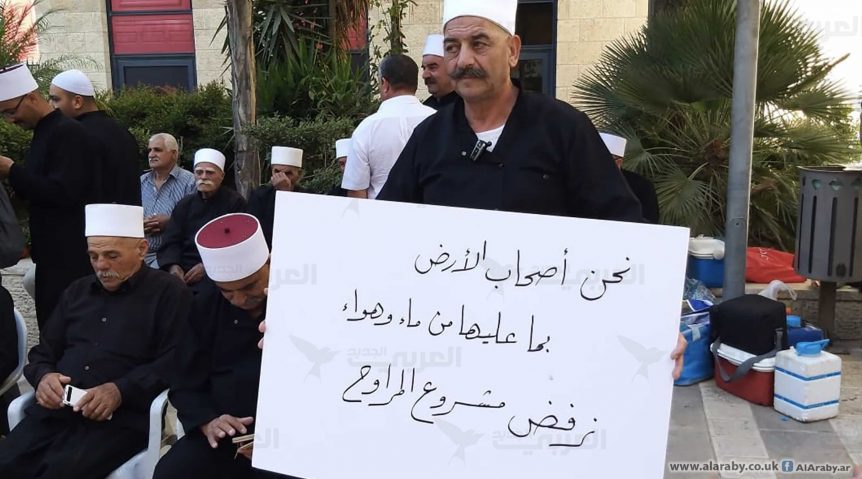On 9 September 2019, Israel’s National Infrastructure Committee (NIC) approved a wind energy project, which is to be built by Israeli company Energix Renewable Energies (Energix) on agricultural lands owned by Syrian residents of the remaining villages in the occupied Syrian Golan. The project is expected to use about 4300 dunams or approximately 1100 acres, which constitutes almost a quarter of the agricultural land controlled by Syrians in the occupied Syrian Golan. The Israeli Cabinet approved this project on January 12, 2020 and the government approved it on January 30, 2020 . If implemented, it would be one of the largest wind energy plants in territory under Israel’s effective control, with a total of 32 wind turbines. These turbines – permitted to reach a height of 220 meters – would be the largest turbines in the world.
The Israeli state approved this project while ignoring hundreds of objections submitted by Syrian agriculture cooperatives and individuals, including a comprehensive objection to the project submitted by Al-Marsad – The Arab Human Rights Centre in Golan Heights in collaboration with the Association for Civil Rights in Israel (ACRI) and Planners for Planning Rights (BIMKOM). The objections were filed on behalf of eleven Syrian agricultural cooperatives and civil society groups, which represent thousands of native Syrians – demonstrating strong opposition among the vast majority of the Syrian population to this dangerous project. Regardless, the Committee rejected all these objections.
Energix’s project would imperil the health and safety of Syrian communities as a result of dangerous exposure to infrasound and shadow flicker. Syrian farmers and civilians who spend much of their time in these agricultural fields and live in the hundreds of houses in the area would be vulnerable to these health impacts, and would be forced to abandon their agricultural lands. According to experts in the fields of agriculture, renewable energy, environment, and physics, the project would also lead to the destruction of these farmers’ traditional agricultural staples of apples and cherries.
Furthermore, the project would heavily restrict the expansion of three out of the five remaining Syrian villages in the occupied Syrian Golan after 1967 (Majdal Shams, Buq’ata, and Masada). This would exacerbate the suffocating housing crisis in the Syrian villages, distort the natural landscape, and also threaten wildlife in the region. Additionally, the project’s location has changed numerous times and has been moved away from Israel’s illegal settlements and closer to Syrian villages and their farmlands. The project discriminates against the indigenous Syrian communities of the occupied Syrian Golan.
The Israeli government is moving forward with this project amidst the ongoing-armed conflict in Syria. Since 2011, Israel has been exploiting this tragic conflict to bolster its illegal occupation and claim sovereignty over the Syrian Golan. On March 25, 2019, US President Trump signed an executive order recognizing Israel’s claim to sovereignty over the occupied Syrian Golan, after which Israel began accelerating its unlawful settlement expansion in the area.
We, the signatory organizations, condemn Energix’s project because of its harmful repercussions on all aspects of Syrians’ lives in the occupied Syrian Golan. The project aims to cement the economic occupation of the Syrian Golan and it violates numerous principles embedded in international humanitarian law, including those enshrined in Article 55 of the 1907 (IV) Hague Convention Respecting the Laws and Customs of War on Land on the prohibition of pillage and the permanent alteration of occupied land as well as the obligation to administer occupied land as “usufructuary.”
Therefore, we call on the Israeli state, as the occupying power, to:
- Fulfill its obligations according to international law by discontinuing this project, ending the policy of settlement expansion, and refraining from making any changes in the occupied Syrian Golan, except in cases in which the security and well-being of the Syrian population require such changes.
- Respect the right to self-determination and permanent sovereignty over natural resources, customary under international law, for the Syrian population in the occupied Syrian Golan.
- Cease both the issuing of licenses for the exploitation of natural resources in the occupied Syrian Golan and for the regulation the activities of Israeli and multinational business enterprises therein; in order to ensure respect of international and human rights standards and the genuine consent of the Syrian population before engaging in any projects that extract their natural resources.
- Cease exploiting the COVID-19 pandemic as a pretext for implementing this project on the ground.
We also call on the international community to:
- Exert pressure on the Israeli state to cease implementation of its wind turbine project and fulfill its obligations arising from international human rights agreements and conventions to respect the rights of the Syrian population in the occupied Golan.
Accordingly, we sign:
- Al-Haq
- Syrian Network for Human Rights (SN4HR)
- FIDH | International Federation for Human Rights
- Syrian Center for Media and Freedom of Expression (SCM)
- Impunity Watch
- Urnammu
- Syria Legal Network in the Netherlands
- Shaml, Syrian CSOs Coalition
- The Day After (TDA)
- Badael
- Fraternity Foundation for Human Rights FFHR-Biratî
- Cairo Institute for Human Rights Studies (CIHRS)
- Ramallah Center for Human Rights Studies (RCHRS)
- Access Center for Human Rights (ACHR)
- Musawa
- Kesh Malek Organization
- Start Point
For more information:
Oumou HOUMOUD: Communications Manager | Syrian Center for Media and Freedom of Expression.
Email: communication.manager@scm.bz
Share this Post

